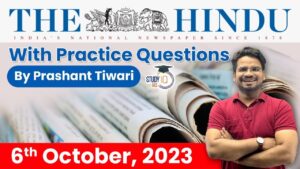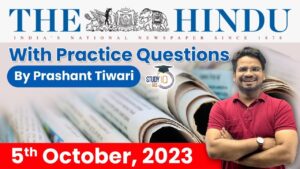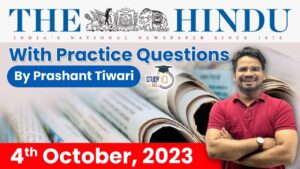The Hindu Newspaper Analysis for UPSC

The Hindu Newspaper Analysis 22 August 2023
- The BRICS grouping has become a platform for discussing the challenges facing the Global South, Prime Minister Narendra Modi said before leaving for South Africa, where he is expected to meet with Chinese President Xi Jinping for the first time since their brief encounter at the G-20 Bali summit last November.
- “BRICS has been pursuing a strong cooperation agenda across various sectors. We value that BRICS has become a platform for discussing and deliberating on issues of concern for the entire Global South, including development imperatives and reform of the multilateral system,” said Mr. Modi in a statement issued before his departure.
- The 15th BRICS summit is the first in-person meet since 2019 and the COVID-19 pandemic, the first since the Russian war in Ukraine, and the first time that Mr. Modi and Mr. Xi will take part in such a restricted gathering of just four leaders since the LAC stand-off began in 2020.


- India’s inflation woes are not over yet but food price spikes may be “transitory”, the Finance Ministry said on Tuesday, attributing the latest spike in headline inflation to global uncertainties triggered by the termination of the Black Sea Grain Initiative that has upset wheat and edible oil supplies, as well as disruptions in domestic farm output.
- The impact of the global disruptions was “clearly evident” in the sharp surge in the retail inflation pace in July to a 15-month high of 7.44%, the Ministry said, noting that the 11.5% food inflation rate was “perhaps the third highest” since the current Consumer Price Index (CPI) series began in 2014. Core inflation, which excludes energy and food costs, was at a 39-month low of 4.9%, it emphasised.
- The global uncertainty and domestic disruptions may keep inflationary pressures elevated for the coming months, warranting greater vigilance from the government and the central bank, the review stressed, underlining the need to bring the focus back on maintaining macroeconomic stability.



- The disqualification was instant because of the Supreme Court of India’s judgment in Lily Thomas vs Union of India (2013). Through this judgment, the Court invalidated Section 8(4) of the Representation of People Act 1951, which had allowed a three-month period within which to appeal. Disqualification was not to take effect during this period; when the appeal is admitted, disqualification would depend on the final outcome of the appeal.
- The top court said that Article 102(1) does not create any difference between the sitting member and a candidate so far as disqualification is concerned. It held that Parliament has no power to grant exemption to sitting members for three months and thus struck down Section 8(4) as ultra vires the Constitution.
- So now, only Section 8(3) remains in the Act which deals with disqualification of persons convicted and sentenced to two years imprisonment. This section simply says that a person who is convicted of an offence and sentenced to imprisonment for not less than two years shall be disqualified from the date of conviction. It does not say that such a person stands disqualified from the date of conviction.

- The Reserve Bank of India (RBI) has initiated a pilot programme aimed at evaluating the feasibility of a ‘Public Tech Platform for Frictionless Credit’, seeking to facilitate seamless and efficient credit delivery by lenders for Credit Appraisal, and therefore boosting Financial Inclusion in India.
- The initiative comes as part of RBI’s developmental and regulatory policies and was introduced following the Monetary Policy Committee (MPC) meeting in August 2023.
- Frictionless credit is a borrowing approach that seeks to streamline the lending process for consumers. Unlike the traditional credit systems, where individuals need to go through extensive paperwork, credit checks, and lengthy approval procedures, frictionless credit promises a smoother and faster experience.
- What is the Public Tech Platform for Frictionless Credit?
- Developed by the Reserve Bank Innovation Hub (RBIH), It is an end-to-end digital platform that will have an open architecture, open Application Programming Interfaces (APIs), and standards to which all banks can connect in a “Plug and Play” Model.
- The public tech platform seeks to make this process seamless by providing all the required information in one place to facilitate credit.

Process:
- The process of delivering credit through digital means involves Credit Appraisal, which evaluates the borrower’s ability to repay the loan and adhere to the credit agreement.
- This process rests on three pillars:
- Adverse selection (information asymmetry between borrowers and lenders)
- Exposure risk measurement
- Default risk assessment.

- More than three months since ethnic violence broke out in Manipur, there are still little or no signs of lasting peace. From competing groups imposing blockades of arterial roads to sporadic attacks resulting in deaths, the conflict is rife with incidents suggesting the breakdown of law and order.
- The events in Manipur so far suggest that the ethnic conflict festers because of the intractable positions by the Meitei and Kuki-Zo leaders.
- The refusal of civil society representatives to rise above their ethnic differences has also exacerbated the conflict, which has worsened due to the lack of accountability of the State government and its refusal to change its leadership — a step that seems to be the only clear possibility of bringing forward reconciliation.
- Manipur is a vital border State and the continuing distrust between the Meitei and Kuki-Zo will have a lasting impact on future generations, severely hampering progress.


- The Centre has assured the Delhi High Court that it will incorporate necessary rules and regulations in its future policies to regulate social media platforms and intermediaries for making them safer from the use of vulgar language, including profanity and bad words.
- In the compliance report filed before the court, the Ministry of Electronics and Information Technology stated that as “part of its regular exercise on policymaking for the techno-legal ecosystem, it gives due consideration to the observations of this honourable court in its judgment to regulate the social media platforms/intermediaries for making it safer from the use of vulgar languages”.
- The court had earlier underlined the need for rules and guidelines to regulate the content on social media and OTT platforms. It had underscored the need for taking seriously the use of vulgar language in public domain and on social media platforms which are open to children of tender age.
- On March 6, the court observed, “The challenge faced by our country, as faced by many other countries, for enacting appropriate law, guidelines and rules to regulate the content on social media and on OTT platforms needs urgent attention”.

- The proposed Bharatiya Nyaya Sanhita Bill (BNS) says that causing “floods” is a terrorist offence.
- The Bill that seeks to replace the British-era Indian Penal Code defines terrorism as a separate offence for the first time as part of a general law. The Unlawful Activities (Prevention) Act, 1967 is a special law focused on terrorist activities.
- Section 111 (6) (a) of the Bill says that a “terrorist” refers to any person who “develops, manufactures, possesses, acquires, transports, supplies or uses weapons, explosives, or releases nuclear, radiological or other dangerous substance, or cause fire, floods or explosions.”
- Section 111 proposes a minimum five-year imprisonment and the death sentence as maximum punishment for a terrorist offence.

- On August 11, Roscosmos, the Russian space agency, launched its Luna 25 spacecraft onboard a Soyuz 2 rocket. But on August 20, Roscosmos stated that Luna 25 had suffered a glitch and crashed on the moon’s surface the previous day, ending the mission in a failure.
- In its statement, Roscosmos said that it would put together a committee to investigate the precise mode of failure of Luna 25. Beyond that, it has only said that the spacecraft suffered a technical problem.
- Whatever the technical reasons for Luna 25’s failure, it’s clear that Russia is falling behind vis-à-vis going to the moon.
- It was initially called Luna-Glob and the name was later changed to make the mission a part of the Luna series, the last edition of which was launched in 1976.

- Fostering tourism, undertaking construction projects and developing infrastructure are ways through which a State generates revenue and creates employment opportunities. However, some of them come at a steep environmental cost.
- Though the northeast is industrially backward, deforestation, floods, and existing industries are causing serious problems to the environment in the region.
- Central and State governments have to develop infrastructure, generate revenue and create employment through sustainable policies.
- The Meghalaya High Court was hearing a Public Interest Litigation (PIL) on the cleanliness of the Umiam Lake. The court in its observation of the Meghalaya Waterbodies (Preservation and Conservation) Guidelines, 2023, said that they did not deal with the “most serious aspect of buildings and construction mushrooming around waterbodies”.


 The Hindu Newspaper Analysis 6 October 2...
The Hindu Newspaper Analysis 6 October 2...
 The Hindu Newspaper Analysis 5 October 2...
The Hindu Newspaper Analysis 5 October 2...
 The Hindu Newspaper Analysis 4 October 2...
The Hindu Newspaper Analysis 4 October 2...





















